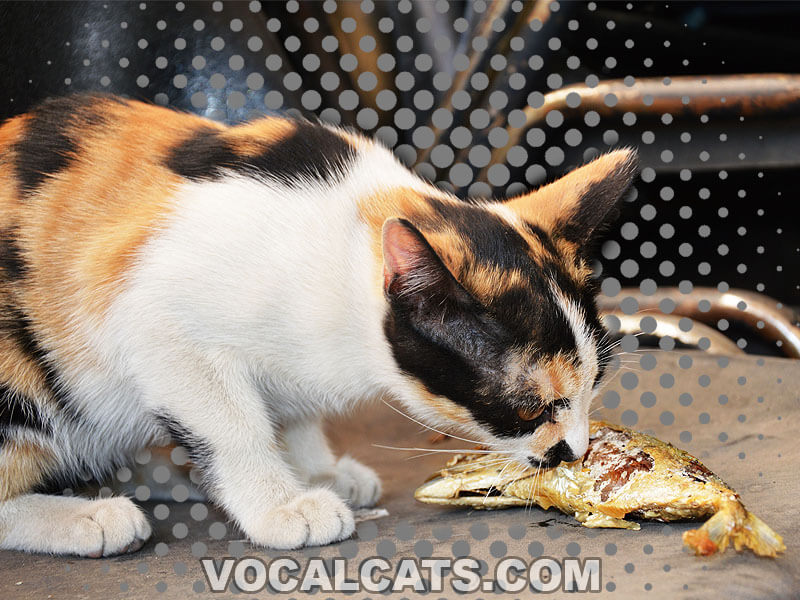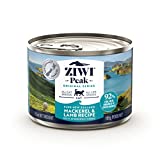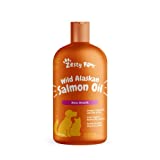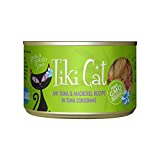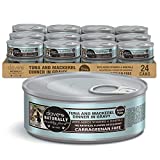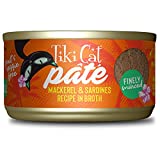Can Cats Eat Mackerel? Yes, cats can eat Atlantic and Pacific Mackerel in small quantities. An excellent source of protein, omega-3 fatty acids, vitamins and minerals, Mackerel improves skin, coat, joint, heart, and nervous system health, and even boosts brain development in kittens. Ideally serve adult cats one portion of plain-cooked fresh Mackerel or water-tinned Mackerel a week.
Cats are obligate carnivores and ideally require 30% to 40% protein in their diet. Sources for animal protein can include beef, chicken, turkey and lamb, or fish-based products like tuna, sardines, and Mackerel.
If you want to feed your cat fish, Mackerel is one of your best options. And in this guide, we will break down all the health benefits of adding Mackerel to your cat’s diet, any potential risks attached, as well as, the differences that set Mackerel apart from other fish types like tuna and sardines.
Contents
- Can Cats Have Mackerel?
- What is Mackerel fish?
- Tuna vs Mackerel for cats
- Do Cats like Mackerel or tuna?
- Are Mackerel good for Cats?
- Are Mackerel bad for Cats?
- Can Mackerel cause diarrhea in Cats?
- Are Mackerel safe for Cats?
- Is Mackerel too salty for cats?
- Can cats eat Mackerel and sardines?
- Are sardines and Mackerel good for Cats?
- Can Cats Eat Mackerel everyday?
- Can cats have whole Mackerel?
- How much Mackerel can I give my cat?
- Can kittens eat Mackerel?
- How to cook Mackerel for Cats
- Mackerel for Cats
- So, Can Cats Eat Mackerel?
- Related Questions
Can Cats Have Mackerel?
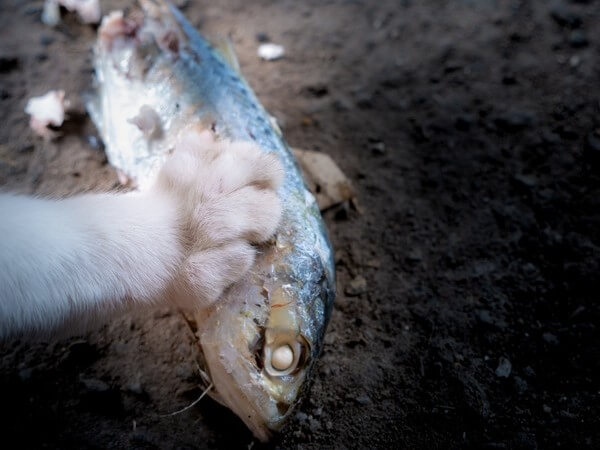
Yes, cats can definitely eat Mackerel. While it isn’t a suitable replacement for other types of animal protein, Mackerel does add a lot of nutritional value to your cat’s diet.
It’s an excellent source of omega-3 fatty acids, vitamins D and B12, selenium, potassium, and zinc.
If you want to add fish to your cat’s diet, Mackerel is a solid option because it has lower levels of mercury than other types of fish. The strong stench of Mackerel also makes it ideal for sneaking medication into your cat’s meal.
Home-cooked Mackerel is the safest choice for your cat, but some types of canned Mackerel are also risk-free. As long as the canned Mackerel does not include sodium, oil, brine, preservatives, or additives, it is safe for your cat to eat. Mackerel canned in spring water is ideal.
RECOMMENDED: Can Cats Eat Anchovies? (Dried, Canned, Raw & Oil)
What is Mackerel fish?
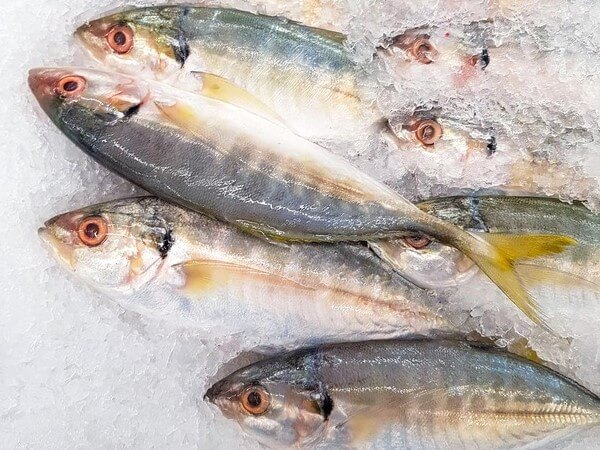
Mackerel is a common name for various species of ocean fish belonging to the Scombridae family.
They are characterized by their elongated, torpedo-shaped bodies, iridescent silver-blue scales on top, and white bellies. Mackerel are fast swimmers known to form large schools, or groups of fish, as they migrate through the water.
These fish are rich in omega-3 fatty acids and other nutrients. Mackerel are commonly found in both temperate and tropical seas around the world.
READ NEXT: Can Cats Eat Shrimp?
Tuna vs Mackerel for cats
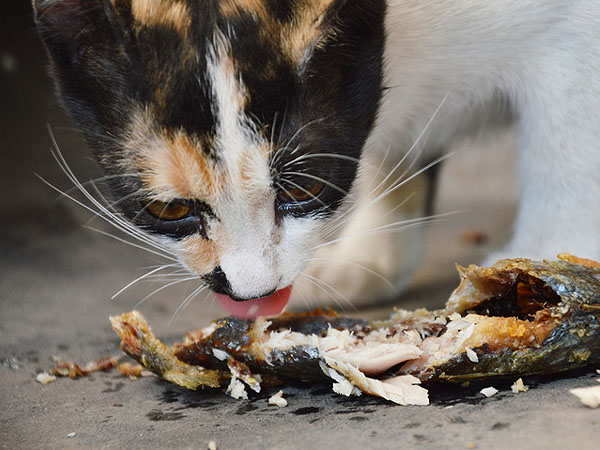
It’s no secret that cats love fish. But when it comes to choosing between tuna and Mackerel, pet parents often struggle to make a decision.
Today we’re going to answer this question:
Is there a difference between Tuna and Mackerel? And which is better for your cat?
| Mackerel | Mackerel & Tuna Similarities | Tuna |
| Contains bones | Oily fish types with omega-3 fatty acids | Easier to remove bones |
| Low mercury levels | High levels of protein | Considerable mercury levels |
| Less expensive | Excellent sources of calcium, magnesium, iron, zinc, vitamin B12 | More expensive |
At the end of the day, the decision often simply comes down to which one your cat prefers.
Do Cats like Mackerel or tuna?
Most cats will be happy to have Mackerel or tuna in their diet. Felines love the fishy taste and pungent smell of both Mackerel and tuna, which is why many cat food brands add both to their products.
READ ALSO: Can Cats Eat Lobster? Read This Before Offering a Bite
Are Mackerel good for Cats?
As a pet parent, it’s up to you to make sure your cat is eating well-balanced and nutritious meals. Mackerel is a great source of animal protein and full of essential nutrients that can boost your cat’s health by improving their digestive system, immunity, skin and coat strength, and even cognitive function.
1. Omega-3 Fatty Acids
Mackerel has extremely high values of omega-3 fatty acids, providing almost 4580 mg of EPA and DHA in a 100 gram serving.
Omega-3 fatty acids are known for their anti-inflammatory properties. According to board-certified Veterinary Nutritionist, Laura Gaylord, DVM, DACVIM, she states that Mackerel can benefit your pet by improving skin, coat, joint, heart, and nervous system health, as well as, promoting brain development in kittens.
2. Vitamin B-12
High in Vitamin B-12 or cobalamin, Mackerel helps support your feline friend’s nervous, and digestive systems, boosts immunity, and resolves gastrointestinal issues. It’s also a treatment option for pet allergies.
3. Protein-Rich
Cats need diets that are high in protein. And with Mackerel, you can get 21 grams of protein per 112 gram portion. Regardless of whether you prefer store-bought or home-made cat food, Mackerel is definitely an ingredient to look out for.
4. Low Levels of Mercury
Despite their numerous benefits, one of the biggest risks with adding fish to your pet’s diet is the mercury levels in seafood.
Luckily, Atlantic Mackerel has some of the lowest levels of mercury contamination. While this isn’t the case for King Mackerel or Spanish Mackerel, you can shop safely and protect your furry family members from harm.
5. High in Selenium
Mackerel also contains significant amounts of Selenium, which has antioxidant benefits, boosts immunity, regulates thyroid hormones, and improves DNA production. It may even reduce risk of cardiovascular illness.
6. Vitamin D
Making sure your indoor cat gets enough Vitamin D in their diet is extremely important, especially for pet parents who don’t let their cats go outside or have sunlit window sills. Mackerel is a good source for Vitamin D.
Are Mackerel bad for Cats?
No, Mackerel is not bad for cats, as long as it is cooked or canned without seasoning. Raw Mackerel can be toxic for cats since it contains harmful bacteria like E Coli, Salmonella, and Listeria.
Similarly, Mackerel that has been canned in brine, oil, spices, preservatives, or additives can be harmful for your cat’s digestive system. Also, avoid feeding your cat King Mackerel. King Mackerel contains high quantities of mercury and may be poisonous for your pet.
Can Mackerel cause diarrhea in Cats?
While small quantities of Mackerel are healthy for cats, overfeeding your cats can cause health problems like diarrhea and vitamin A toxicity. It can also delay wound healing by slowing down blood clotting.
CHECK OUT: Can Cats Eat Imitation Crab? Purr-suing the Truth About Surimi!
Are Mackerel safe for Cats?
Yes, Atlantic Mackerel is safe for cats to eat, provided it is plain, cooked, or canned in water. In fact, since Mackerel is an oily fish, it can also serve as a treatment for constipation or hairballs. Your cats can safely eat one serving of Mackerel a week.
It’s important to note that Mackerel is best given to your furry friends as an occasional treat to reward them for good behavior. It should not replace their regular diet pr main meal.
Is Mackerel too salty for cats?
This depends entirely on how the Mackerel is cooked and how much Mackerel you’re feeding your kitties. Mackerel that has been smoked or cooked with oil, butter, salt, and spices will have high sodium levels that are toxic for cats.
Similarly, Mackerel canned in sodium, oil, spices, brine, or preservatives will also be too salty for cats to eat safely.
DON’T MISS: Can Cats Eat Crab?
To ensure your fuzzy friends enjoy the nutritional benefits of Mackerel without the risks, it’s important to choose feline-friendly Mackerel food.
Dave’s Naturally Healthy Cat Food offers a safe and delicious alternative. This carefully formulated cat food has the appropriate salt content, making it a healthy choice for your cat.
It is also rich in protein, essential nutrients, and omega-3 fatty acids. All of these contribute to your cat’s overall well-being.
By transitioning to Dave’s Naturally Healthy Cat Food, you can provide your cats with the tasty and nutritious meals they deserve, without worrying about the potential dangers of feeding them store-bought Mackerel. Give your furry friends the best by choosing a cat food that has their health and happiness in mind.
Can cats eat Mackerel and sardines?
Yes, cats can eat Mackerel and sardines in moderate amounts. Both offer a healthy source of protein, omega-3 fatty acids, and plenty of important vitamins and minerals.
However, Mackerel and sardines are not a suitable replacement for other types of animal protein in your cat’s diet as they lack essential nutrients like taurine.
Which begs the question, do these ingredients add value to your cat’s diet?
Are sardines and Mackerel good for Cats?
Some cats do love to eat fish because of its taste and smell. If you want to feed your cat fish, Mackerel is one of your best options.
Rich in protein, omega-3 fatty acids, and a variety of other essential nutrients, Mackerel is a high-value ingredient with incredible health benefits. Not to mention, its fishy smell and taste will have your cat obsessed with this tasty treat.
But what about sardines? Are sardines good for cats too?
Below is a table that list the health benefits of each type of fish. With the table below, we hope this can help you decide which fish is better for your fuzzy family members.
| Mackerel Benefits | Mackerel & Sardines Similarities | Sardines Benefits |
| High in potassium | High levels of protein | High in calcium |
| Low in cholesterol and sodium | Low levels of mercury | Low in calories and fats |
| Excellent sources of phosphorus, iron, vitamin B3, B6, and B12 |
We do want to reiterate that while both sardines and Mackerel can be good for cats, they should not replace your cat’s regular diet. That’s because these fishes do not fulfill all of your cat’s nutritional needs.
However, the good news is that there are canned wet food with Mackerel and sardines recipe made specifically for cats. So if your fuzzy friends love the taste of both types of fish, they’re in luck! The Tiki Cat Mackerel And Sardines are made with your cats in mind.
Can Cats Eat Mackerel everyday?
No, cats should not eat Mackerel every day. Feeding your cats Mackerel everyday would overwhelm their digestive system. High quantities of Mackerel can cause vitamin E deficiency.
Signs and symptoms of vitamin E deficiency in cats include the following:
- Colon hemorrhages.
- Muscle weakness.
- Liver hepatitis.
- Abdominal sensitivity.
- Heart dysfunction.
An overdose of Pacific Mackerel can also cause a vitamin B deficiency.
Can cats have whole Mackerel?
Whole Mackerel contains small bones that are both sharp and dangerous. You should not feed cats whole Mackerel because it contains pin bones, which can puncture their tongue, mouth, gum, and throat.
If you’re going to prepare homemade Mackerel for your four-legged friends, you need to filet the fish and safely remove all of the bones.
How much Mackerel can I give my cat?
You can feed your cat one (1) serving or three (3) ounces of Atlantic or Pacific Mackerel once a week. If you’re using it as a treat, try feeding them smaller portions throughout the week.
You can also add one (1) small piece of Mackerel to their regular meal to entice them into eating their regular food.
Can kittens eat Mackerel?
Kittens can eat Mackerel in extremely small portions. In fact, there is even research showing that Mackerel can stimulate healthy brain development in kittens. That said you should feed your kittens extremely small portions of fish that their bodies are able to tolerate and easily digest.
Ideally, feed your kitten no more than half a serving of Mackerel (1.5 ounces) per week.
How to cook Mackerel for Cats
Here’s an easy-to-follow guide on how to cook Mackerel for your fuzzy friends:
- Choose a fresh Mackerel: Select fresh or frozen Mackerel that has no added salt or seasonings.
- Thaw the fish: If the Mackerel is frozen, let it thaw in the refrigerator overnight.
- Remove the bones: Carefully remove any bones from the Mackerel using a knife or your fingers. Fish bones can be a choking hazard for cats.
- Pre-heat your oven: Set the oven to 350°F (175°C) and let it pre-heat.
- Prepare the fish: Rinse the Mackerel under cold water and pat it dry with a paper towel. Place the fish on a baking sheet lined with aluminum foil or parchment paper.
- Cook the Mackerel: Place the Mackerel in the preheated oven. Bake for about 15 to 20 minutes, or until the fish is cooked through and flakes easily with a fork.
- Cool and serve: Remove the Mackerel from the oven and let it cool for a few minutes. Once it’s cool enough, break the fish into small, bite-sized pieces. Make sure there are no bones on the fish.
- Serve to your cat: Offer a small portion of the cooked Mackerel to your cat as an occasional treat. Store the leftovers in an airtight container in the refrigerator. Be sure to consume within 2 to 3 days.
Remember that Mackerel should only be given as an occasional treat and should not replace your cat’s regular, well-balanced diet.
Mackerel for Cats
If you don’t have the time to prepare Mackerel at home you may want to feed your cat feline-friendly canned Mackerel. There are certain rules you have to follow when you’re giving your pet canned fish.
In this section, we are going to discuss the do’s and don’ts of buying canned Mackerel for cats.
Can Cats Eat Canned Mackerel?
Yes, cats can eat canned Mackerel as long as it is canned in water.
Avoid canned Mackerel that’s brine in salt because as much as a teaspoon of salt is enough to give your cats sodium poisoning. That’s why Mackerel that has been canned in brine, spices, preservatives, tomato sauce, and most types of oil is unsafe for cats to eat.
Rather than offering your kitties canned Mackerel made for human consumption, consider serving them Ziwi Peak Mackerel and Lamb Cat Food instead. Ziwi Mackerel And Lamb Cat Food is just what your furry friends need without the extra sodium or oil.
Can cats have canned Mackerel?
Yes, cats can safely eat canned Atlantic or Pacific Mackerel. On the other hand, King or Spanish Mackerel is not suitable for cats since it contains high amounts of sodium and mercury that can be toxic for your pet. If you’re buying canned Mackerel make sure you read the ingredient list carefully so you can pick the safest products for your cat.
Will cats eat canned Mackerel?
Whether or not your cat will eat canned Mackerel depends entirely on their food preferences. While most cats love the scent and taste of Mackerel, some don’t care for seafood at all. At the end of the day, it all comes down to variations in taste buds.
If it’s your first time feeding your cat Mackerel, start with a small portion and give your cat time to adjust to the new smell and taste.
Can Cats Eat human Canned Mackerel?
Human canned Mackerel is not suitable for feline consumption when it has been brined in salt, sauces, spices, and other flavorings. Plain-cooked Mackerel canned in water is perfectly safe for cats to eat.
Can Cats Eat Mackerel in oil?
As a general rule, you should avoid feeding your cat Mackerel in oil when possible. While small quantities of olive and sunflower oil are safe for your cat, excessive amounts can lead to vomiting and diarrhea.
On the other hand, large amounts of soybean oil consumption can cause inflammation.
Can Cats Eat Mackerel in Olive oil?
Yes, cats can eat Mackerel in olive oil in moderation. That’s because Olive oil is safe for cats in small quantities.
Regardless, it’s a good idea to drain the oil from the Mackerel before feeding it to your cat. Olive oil contains high amount of fat and consuming too much fat can upset your feline friend’s digestive system and cause diarrhea and vomiting.
Can Cats Eat Mackerel in Sunflower oil?
Yes, cats can eat Mackerel that has been canned in sunflower oil. However, an excess of sunflower oil can cause weight gain and diabetes.
When feeding your cat oil packed Mackerel, try to remove as much of the oil as possible using a paper towel or by rinsing it.
Can Cats Eat Mackerel in tomato sauce?
No, cats should not eat Mackerel in tomato sauce. These sauces contain high amounts of salt, garlic, spices, additives, and preservatives that are extremely harmful for your cat. Feeding your cat Mackerel in tomato sauce can lead to digestive issues, seizures, or even sodium poisoning.
Can cats have Mackerel in tomato sauce?
As we can see, Mackerel in tomato sauce is not safe for cats to eat. The primary reason for this is the high quantity of sodium which is toxic for felines. Additionally, the ingredients in tomato sauce includes onions, garlic, and chives, all of which are toxic to cats. So your furry friends should definitely stay far away from the tomato sauce!
Can Cats Eat fresh Mackerel?
Cats can eat fresh Mackerel that has been filet, steamed, or boiled. Frying and smoking fresh Mackerel increases the oil and salt quantities, making it unhealthy for cats.
Fresh Mackerel is the safest option for cats as long as it is prepared without harmful ingredients like oil, salt, and spices.
Can Cats Eat raw Mackerel?
No, cats should not eat raw Mackerel because it contains harmful bacteria and parasites like salmonella, listeria, clostridium, and vibrio. These pathogens can result in immense damage to your cat’s digestive and immune systems.
Can Cats Eat Mackerel in brine?
No, Mackerel canned in brine is toxic for cats. Brine consists of a high-concentration of salt that can easily cause sodium poisoning in cats. Hence you should avoid feeding your cat any food or treat that have been packed in brine.
Signs and symptoms of salt toxicity in cats include:
- Vomiting.
- Diarrhea.
- Lethargy.
- Excessive thirst.
- Increased urination.
- Swelling or edema.
- Incoordination.
- Seizures (in severe cases).
- Coma (in severe cases).
If you suspect your cat has salt poisoning, we highly recommend that you contact your veterinarian as soon as possible. Sodium poisoning requires immediate medical attention.
Your vet can provide appropriate treatments to help manage the symptoms and restore your furry friend’s electrolyte balance.
Can cats have Mackerel in brine?
As we can see, Mackerel packed in brine is incredibly toxic for your cat. As a pet parent, you need to keep in mind that more that half a tablespoon of salt is toxic for large cats that weigh between 11 to 25 pounds.
On the other hand, 0.05 tablespoon of salt is enough to poison a small cat that weighs between 1 and 10 pounds.
Can Cats Eat smoked Mackerel?
No, cats should not eat smoked Mackerel since it is high in salt. The harm from the sodium in smoked Mackerel will outdo any benefit your cat will receive from its nutritional value.
Instead you can cook Mackerel at home by deboning and steaming it.
Can Cats Eat Mackerel bones?
No, cats should not eat Mackerel bones. While these bones may be small and sharp, they can easily puncture your cat’s tongue, gum, mouth, and throat. In fact, if swallowed whole, Mackerel bones can also cause internal organ damage.
Can Cats Eat Mackerel skin?
Yes, cats can eat Mackerel skin in moderation if it is cooked properly. The skin is high in omega-3 fatty acids and other nutrients making it a healthy and tasty treat for your pet’s taste buds. Many cats enjoy the taste of skin so the decision often comes down to preference.
So, Can Cats Eat Mackerel?
At the end of the day, Mackerel is a healthy source of protein, omega-3 fatty acids, vitamin B12 and a number of other essential nutrients. Feeding your cat one (1) portion of Mackerel per week will boost his skin and coat health, improve digestion, remove hairballs, and even strengthen his cardiovascular system.
The safest ways to feed your cats Mackerel include plain-cooked fresh Mackerel or canned Mackerel in water.
If these aren’t available, you can feed your cat Mackerel that has been canned in sunflower or olive oil, but be sure to drain the oil, rinse it in cool water, and dab the fish clean with a paper towel.
Related Questions
Canned salmon, king Mackerel, and Spanish Mackerel are all unsafe for cats to eat. These fish often contain high amounts of salt and other pollutants like mercury.
Cats and dogs can safely eat Atlantic and Pacific Mackerel that have been cooked without oils, salt, spices, sauces, and preservatives.
DISCLAIMER: THIS WEBSITE DOES NOT PROVIDE MEDICAL ADVICE
The information, including but not limited to, text, graphics, images and other material contained on this website are for informational purposes only. No material on this site is intended to be a substitute for professional veterinary advice, diagnosis, or treatment. Always seek the advice of your veterinarian or other qualified health care provider with any questions you may have regarding dietary needs.
Resources:
https://en.wikipedia.org/wiki/Mackerel

With over five years of specialized experience as an animal writer, my expertise lies in cat nutrition, health, behavior, grooming, and training. I am dedicated to delivering helpful and informative content that caters to the well-being of our feline friends. My primary goal is to empower pet owners with knowledge and ensure our feline companions thrive in health and happiness. In my free time, I love volunteering at local cat rescue centers.
